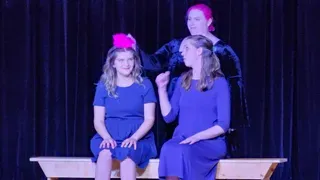May 25, 2014
The Animals -- Love Letters Between Christopher Isherwood And Don Bachardy
Michael Cox READ TIME: 3 MIN.
In a period where gay marriage is both prevalent and inevitable, it's wonderful to look back on the relatively scant examples of long-term gay relationships throughout history, so that we may better understand how to nurture our own.
Christopher Isherwood is a writer that has contributed so much information about the way that gay men lived their lives in the 20th Century. But his most pertinent insight may come from the way he lived his own.
Isherwood was already a celebrated author when he met Don Bachardy in 1952. The previous year "I Am a Camera" had opened on Broadway, an adaptation of his book "Berlin Stories" that would go on to become the legendary musical "Cabaret."
This writer, who spoke with surprising frankness about desire and gay men's lives in Europe during World War II, first became sexually involved with Bachardy's brother, but his relationship with Bachardy was more than sexual. It would last for three decades despite the difference in their ages (Bachardy was merely a teenager when they met and Isherwood was born in the early years of that century).
"The Animals: Love Letters Between Christopher Isherwood and Don Bachardy" may be the purest form of documentary, a record of a personal communication between two people, without editorial, and merely footnotes that explain certain references.
Editor Katherine Bucknell provides a long introduction that explains the couple's situation and the peculiar yet endearing way that they related to each other, through animal identities that they referred to in third person. Isherwood was an old, gray workhorse named Dobbin and Bachardy was the nervous and erratic white Kitty.
"I miss rides through London on old Dobbin," Bachardy writes in one of the first collected letters of the book (Isherwood went to Cheshire to visit his mother and brother for a few days), "and think a lot about him, sleeping in a strange stable, eating cold oats out of an ill-fitting feedbag and having no cat fur to keep him warm."
In letters that span from 1956 to 1970, a fascinating story is told of a boy who is trying to find his place in the world a man who is utterly devoted to him. These men spend time together and apart, collaborating with each other artistically and each pursuing a series of different lovers, but they always return to each other. At some point in this history the relationship shows the sign of serious jeopardy as Bachardy becomes deeply involved with the wunderkind director Anthony Page, but Dobbin stays in his stable until his Kitty eventually returns.
"The fact is," Bachardy reports of his relationship with Page, "I think we are chemically an unsafe mixture and, being as we were in very confined quarters, there was bound to be an explosion if I didn't get out."
In the end, we see Isherwood and Bachardy as intelligent and articulate men who somehow held on to a long-term relationship by examining their lives as infantile animal personas.
"Kitty pants at the thought of the return of his Only Muzzlelove," Bachardy sums up one of his later letters, "and lives only to lick that salty old Hide with his rough little pink tongue and make it tingle again. Furballs and pink cat kisses, Purrpuss."
Paperback
$30.00 U.S. / $34.50 Can.
www.fsgbooks.com





